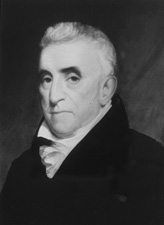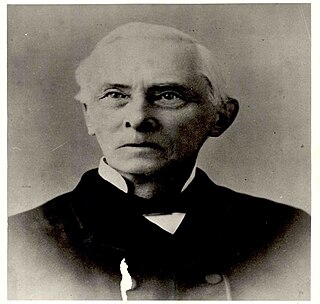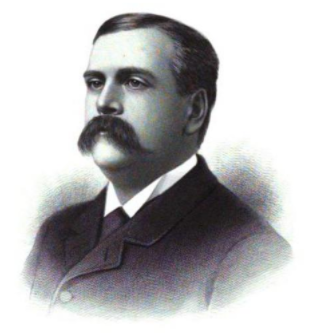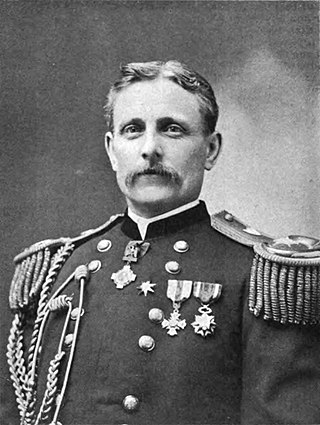
Connecticut is the southernmost state in the New England region of the Northeastern United States. As of the 2020 United States census, Connecticut was home to over 3.6 million residents, its highest decennial count ever, growing every decade since 1790.

James Hammond Trumbull was an American historian, philologist, bibliographer, and politician. A scholar of American Indian languages, he served as the first Connecticut State Librarian in 1854 and as Secretary of State from 1861 to 1866.

David Daggett was a U.S. senator, mayor of New Haven, Connecticut, Judge of the Connecticut Supreme Court of Errors, and a founder of the Yale Law School. He helped block plans for the first college for African Americans in the United States and presided over the conviction of a woman running a boarding school for African Americans in violation of Connecticut's recently passed Black Law. He judged African Americans not to be citizens and supported their colonization to Africa.

David Humphreys was an American Revolutionary War colonel and aide de camp to George Washington, a secretary and intelligence agent for Benjamin Franklin in Paris, American minister to Portugal and then to Spain, entrepreneur who brought Merino sheep to America, and member of the Connecticut state legislature. He also was a prolific poet and author and a member of the Hartford Wits. As speechwriter to George Washington during his administration, Humphreys was the nation's first U.S. presidential speechwriter.

The Connecticut Colony or Colony of Connecticut, originally known as the Connecticut River Colony or simply the River Colony, was an English colony in New England which later became Connecticut. It was organized on March 3, 1636 as a settlement for a Puritan congregation, and the English permanently gained control of the region in 1637 after struggles with the Dutch. The colony was later the scene of a bloody war between the colonists and Pequot Indians known as the Pequot War. Connecticut Colony played a significant role in the establishment of self-government in the New World with its refusal to surrender local authority to the Dominion of New England, an event known as the Charter Oak incident which occurred at Jeremy Adams' inn and tavern.

The Connecticut State House of Representatives is the lower house in the Connecticut General Assembly, the state legislature of the U.S. state of Connecticut. The house is composed of 151 members representing an equal number of districts, with each constituency containing nearly 22,600 residents. Representatives are elected to two-year terms with no term limits. The House convenes within the Connecticut State Capitol in Hartford.

Richard Dudley Hubbard was a United States representative and the 48th Governor of Connecticut.
Colin Macrae Ingersoll was a Connecticut attorney, politician, and military leader. He served as a member of the United States House of Representatives for two terms in the 1850s.

Rollin Simmons Woodruff was an American politician and the 62nd governor of Connecticut.
Charles Tudor Hillyer, was a prominent Connecticut resident from East Granby who served as the state's Adjutant General from 1840 to 1845. Prior to serving as adjutant general, he served in state politics, being elected to the state house of representatives in 1828 and 1830 and then elected to the state senate in 1836. He was the first president of Charter Oak Bank in 1855, a position he held until 1879. While serving as a bank president, he served as a Union general during the American Civil War. Charles Hillyer also established Hillyer College which is now part of the University of Hartford. Charles Hillyer was very active in the Y.M.C.A. and founded the chapter in Hartford, Connecticut.

Rev. Thomas Robbins, D.D. was a Congregational minister, a bibliophile, and an antiquarian. He became the first librarian of the Connecticut Historical Society.
Samuel L. Pitkin, born in Hartford, Connecticut on April 1, 1803, was the Adjutant General for the State of Connecticut from 1837 to 1839. He was a member of the Pitkin family of Hartford, who were very active in politics, the military, industry and banking in early Connecticut. His great-great-great grandfather, William Pitkin, emigrated to the new world from England in 1635 after receiving an inheritance. His grandson, also named William Pitkin would serve as governor of Connecticut Colony from 1766 to 1769.
Justin Hodge, born in Roxbury, Massachusetts on April 21, 1815, was a Connecticut politician who served in the state legislature for many years. He represented his hometown of Barkhamstead as a loyal member of the Democratic Party. He served in the U.S. Army during the Civil War as well as the Mexican War before that. He briefly served as the Adjutant General of Connecticut in 1855.

John C. Hollister, born in Manchester, Vermont on June 2, 1818, was the tenth Adjutant General of the State of Connecticut. From 1850 to 1865 he was Justice of the Peace and as such Acting Judge of the City Court of New Haven, and served as clerk of the state senate in 1848. He was a superintendent of the Sunday School of St. Paul's Episcopal Church in New Haven, as well as treasurer of the parish.
Stephen R. Smith was born in Whitneyville, Connecticut, and was the twenty-fourth Adjutant General of the State of Connecticut. He was an active leader of the Republican Party; he served as an alderman and a councilman. He was also a Grand Marshal at the Grand Lodge of the State.

Lucius Albert Barbour was the twenty-six Adjutant General of the State of Connecticut. Barbour was a teller in the Charter Oak Bank. Barbour political affiliations were with the Republican Party. He was a member of the House of Representatives in 1879; he served as the colleague of the late Hon. Henry C. Robinson. In 1884 Barbour became treasurer and president of the Willimantic Linen Co. He was part of the first Congregational Church of Hartford. He was a member of the Hartford Club, Acorn Club of Connecticut, and the automobile club of Hartford. Barbour was identified with Battle Flag Day, being a member of the legislative committee which had the arrangements in charge. Barbour was one of the prominent men of Connecticut. His descendants on both sides of the families have been conspicuous in the history of New England for over two and a half centuries.

Edward Elias Bradley was the twenty eighth Adjutant General of the State of Connecticut. Bradley served as president of the Boston Buckboard and Carriage Company. He also headed the News Publishing Company. Bradley during 1901 to 1903 was the president of the New Haven Chamber of Commerce. He was commissioner of the public parks of New Haven from 1888 to 1901, and in 1910 became the president of the parks commission. Bradley was president of the Governor’s staff Association of Connecticut from 1903 to 1911. Bradley was president of the Defender Monument Association, which raised funds for the defenders monument to commemorate the successful defense of the West River. He was also the president of the Young’s Men Institute. In 1883, Bradley represented the town of Orange, Connecticut in the general assembly. Bradley was a Democrat and introduced and advocated the constitutional amendment for biennial sessions of the Legislature, which was accepted. He was the director of New Haven National Bank and was the director of Quinnipiac Fire Insurance.
Charles P. Graham, was born in Utica, New York, and was the twenty ninth Adjutant General of the State of Connecticut. Graham was one of the original dental commissioners of the state being first appointed in 1893. In 1896 he served as president of the State Dental Society. Graham was a prominent member of the Universalist Church. He practiced dentistry for 36 years.

George Malpas Cole, was the thirty-second Adjutant General of the State of Connecticut. He was the son of George Cole and Jane A. Malpas. Born in Portsmouth, England, his family moved to Massachusetts where his father was a civil engineer. Cole was educated in public and private schools. Cole was also tutored by his father, where he became an assistant to his father. Cole would later become associated with a wholesale and a grain business in New London.

Major General Francis J. Evon Jr. is the Adjutant General of the Connecticut National Guard. He is responsible to the Governor and the Chief, National Guard Bureau, for providing operationally trained, equipped and mission-ready forces to support both U.S. mobilization requirements and state emergency operations to include developing and coordinating counter terrorism and domestic preparedness contingencies for the State of Connecticut. He implements policies, programs, and plans as the direct link to all state assigned National Guard resources, providing information and evaluation, issue resolution and action recommendations. General Evon began his military career in 1985 as an enlisted Anti-Tank Crewman in the Combat Support Company, 2nd Battalion, 102nd Infantry of the Connecticut Army National Guard. He was commissioned through the Army Reserve Officers’ Training Corps in 1989. Major General Evon has held command leadership positions at the company, battalion, and brigade levels. He served as commander of the 1st Battalion, 102d Infantry Regiment in Afghanistan during Operation Enduring Freedom from November 2009 to November 2010. Prior to his current assignment, General Evon served as the assistant adjutant general for the Connecticut Army National Guard. His promotion to major general was confirmed at the federal level by the U.S. Senate on May 23, 2019.













